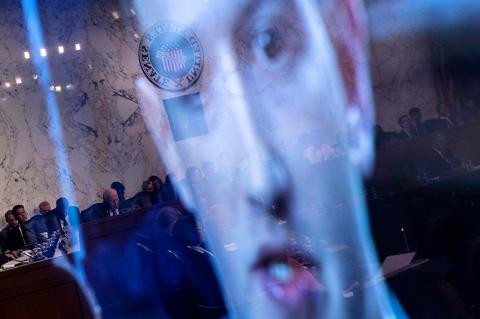US senators grilling Facebook Inc cofounder Mark Zuckerberg over a data leak signaled they might move to rein in the social media giant, which has thrived as part of an online industry that has largely escaped regulation.
“Your user agreement sucks,” US Senator John Kennedy told the 33-year-old CEO on Tuesday. “I don’t want to vote to have to regulate Facebook, but by God I will. A lot of that depends on you.”
Zuckerberg spent hours as the sole witness before a joint hearing of two committees mustering nearly half of the US Senate members.

Photo: AFP
The appearance followed the revelation that data from as many as 87 million users was siphoned to Cambridge Analytica, a British firm with ties to the 2016 campaign of US President Donald Trump.
Zuckerberg was to testify yesterday before the House of Representatives’ Energy and Commerce Committee, rounding out a Capitol Hill tour that is part apology and part defense of the company that has grown to encompass 2 billion users worldwide since being founded in a Harvard University dorm room in 2004.
On Tuesday, Zuckerberg said he was willing to consider new restrictions and agreed to send suggestions to Congress.
“My position is not that there should be no regulation,” Zuckerberg said. “The real question, as the Internet becomes more important in people’s lives, is what is the right regulation.”
Facebook, fending off the Cambridge Analytica furor, has promised steps to improve transparency, saying, for instance, that it would create a searchable archive for federal election advertisements.
Some lawmakers said they did not view Facebook’s recent steps as enough. Senators said there would be more hearings. Some greeted Zuckerberg with thinly disguised belligerence.
US Senator Lindsey Graham, in a statement after questioning Zuckerberg, said there is “a dark side to Facebook.”
“Facebook is a virtual monopoly and monopolies need to be regulated,” Graham said.
“The status quo no longer works,” said US Senator Chuck Grassley, chairman of the US Senate Committee on the Judiciary. “Congress must determine if and how we need to strengthen privacy standards.”
Republicans hold majorities in both houses of Congress, and the party has historically been averse to regulating industry, so their statements envisioning regulation carry significance.
At Tuesday’s hearing Republican senators, including Roger Wicker and Orrin Hatch, cautioned against regulation.
Democrats are ready to lean in, casting the Cambridge Analytica scandal as a watershed.
“Oh sure, I think we’re going to have to do privacy legislation now,” US Senator Amy Klobuchar said in an interview during the hearing.
“The day of reckoning for American privacy has arrived,” US Senator Ed Markey said. “Facebook now has to deal with how much people understand about how vulnerable all their information is and how few protections are on the books. So I do think this is a legislating moment.”
Markey said he introduced a privacy bill on Tuesday, cosponsored with Richard Blumenthal, that offers a suite of new protections for consumers.

The US government has signed defense cooperation agreements with Japan and the Philippines to boost the deterrence capabilities of countries in the first island chain, a report by the National Security Bureau (NSB) showed. The main countries on the first island chain include the two nations and Taiwan. The bureau is to present the report at a meeting of the legislature’s Foreign Affairs and National Defense Committee tomorrow. The US military has deployed Typhon missile systems to Japan’s Yamaguchi Prefecture and Zambales province in the Philippines during their joint military exercises. It has also installed NMESIS anti-ship systems in Japan’s Okinawa

‘WIN-WIN’: The Philippines, and central and eastern European countries are important potential drone cooperation partners, Minister of Foreign Affairs Lin Chia-lung said Minister of Foreign Affairs Lin Chia-lung (林佳龍) in an interview published yesterday confirmed that there are joint ventures between Taiwan and Poland in the drone industry. Lin made the remark in an exclusive interview with the Chinese-language Liberty Times (the Taipei Times’ sister paper). The government-backed Taiwan Excellence Drone International Business Opportunities Alliance and the Polish Chamber of Unmanned Systems on Wednesday last week signed a memorandum of understanding in Poland to develop a “non-China” supply chain for drones and work together on key technologies. Asked if Taiwan prioritized Poland among central and eastern European countries in drone collaboration, Lin

NO CONFIDENCE MOTION? The premier said that being toppled by the legislature for defending the Constitution would be a democratic badge of honor for him Premier Cho Jung-tai (卓榮泰) yesterday announced that the Cabinet would not countersign the amendments to the local revenue-sharing law passed by the Legislative Yuan last month. Cho said the decision not to countersign the amendments to the Act Governing the Allocation of Government Revenues and Expenditures (財政收支劃分法) was made in accordance with the Constitution. “The decision aims to safeguard our Constitution,” he said. The Constitution stipulates the president shall, in accordance with law, promulgate laws and issue mandates with the countersignature of the head of the Executive Yuan, or with the countersignatures of both the head of the Executive Yuan and ministers or

CABINET APPROVAL: People seeking assisted reproduction must be assessed to determine whether they would be adequate parents, the planned changes say Proposed amendments to the Assisted Reproduction Act (人工生殖法) advanced yesterday by the Executive Yuan would grant married lesbian couples and single women access to legal assisted reproductive services. The proposed revisions are “based on the fundamental principle of respecting women’s reproductive autonomy,” Cabinet spokesperson Michelle Lee (李慧芝) quoted Vice Premier Cheng Li-chiun (鄭麗君), who presided over a Cabinet meeting earlier yesterday, as saying at the briefing. The draft amendment would be submitted to the legislature for review. The Ministry of Health and Welfare, which proposed the amendments, said that experts on children’s rights, gender equality, law and medicine attended cross-disciplinary meetings, adding that